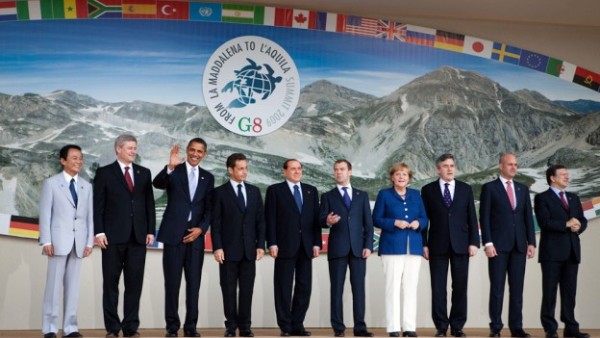 Leaders of the world’s richest and fastest-growing economies are pushing for climate action even though their citizens have yet to wake up to the scale of the problem. Above, national leaders pose at the most recent G8 meeting last June in Italy. (White House Photo).Something unusual seems to be happening in the struggle to wake the world up to the reality of climate change. Almost unprecedented for an environmental issue, national leaders appear to be out ahead of public opinion in their respective countries.
Leaders of the world’s richest and fastest-growing economies are pushing for climate action even though their citizens have yet to wake up to the scale of the problem. Above, national leaders pose at the most recent G8 meeting last June in Italy. (White House Photo).Something unusual seems to be happening in the struggle to wake the world up to the reality of climate change. Almost unprecedented for an environmental issue, national leaders appear to be out ahead of public opinion in their respective countries.
President Obama has made climate action one of his top priorities after health care. Gordon Brown, the British Prime Minister, is spending much of his time trying to lay the grounds for a successful deal at December’s climate conference in Copenhagen, while his chief rival, Conservative Party leader David Cameron (expected to succeed him after national elections in the spring) has made combatting global warming a signature issue.
President Nicolas Sarkozy of France, an unexpected environmentalist, is backing a carbon tax. The recently reelected German chancellor, Angela Merkel, has long been in the vanguard of moves to tackle climate change. The new Japanese prime minister, Yukio Hatoyama, announced a stringent target for carbon cuts as one of his first acts after being elected last month. And Kevin Rudd, Australia’s leader, has likewise radically overturned the obstructionist position of his predecessor.
Yet not one of these leaders has been under great pressure from their citizens to get serious about global warming. Though there is plenty of evidence that the majority of people in their countries accept climate change as a reality and think that something should be done to tackle it, there is little sign of an overwhelming demand for urgent action. Indeed, Gordon Brown and his ministers have often privately urged green NGOs to mobilize a mass campaign so as to give them the “political space” to act.
The paradox is even more marked in some rapidly industrializing countries in the developing world, where there is even less sign of popular pressure. Yet, Mexico’s president, Felipe Calderon, is preparing a detailed offer to cut the growth in his country’s carbon emissions to place on the table in Copenhagen. Hu Jintao, meanwhile, chose to make the first-ever speech by a Chinese president to the UN General Assembly at last month’s climate summit.
Even Manmohan Singh, prime minister of the hitherto somewhat recalcitrant India, has ordered a more internationalist approach, telling ministers: “We may not have caused the problem, but we must be part of the solution.”
This leadership of the leaders is welcome, but it has its limitations, most obviously in the United States where the constitutional separation of powers makes senators responding to their respective states’ interests prove a powerful obstacle. But other countries are not immune from political inaction. The embattled Gordon Brown is getting no measurable political uplift from his work on climate change, while a sympathetic Conservative backbencher says that support for David Cameron’s sincere concern is “paper thin” in his parliamentary party.
Yet the leaders surely need not be isolated, for despite a vocal skeptic minority, solid majorities in developed countries, at least, understand that climate change is real, is caused by human activity and requires action.
Eighty-five percent of Britons, polls show, are convinced that global warming is already a threat or will become so soon. Sixty-seven percent of Australians back their government’s Carbon Pollution Reduction Scheme, even though it has run into trouble in parliament. And 83 percent of Democrats and 53 percent of Republicans in the United States have told pollsters that they believe global warning is already happening.
So why does this not turn into intense political pressure? One reason seems to be that much of the concern is still relatively soft and has not been translated into action even on a personal level. In the United States, one survey found that just 18 percent of respondents were alarmed enough to be doing something in their own lives to address climate change (not bad compared to the 7 percent of outright deniers, but far short of overwhelming). In Britain, only about a third of those concerned said that they thought they did enough personally to address global warming.
Experts point to two apparently contradictory, but not mutually exclusive, reasons for this. The first is that most people do not realize how serious things are, partly because the scientists have not been yelling. “For long we have been reluctant to spell out clearly the true implications of our analysis, instead couching out conclusions as challenging but politically palatable,” says Prof. Kevin Anderson of Britain’s blue-chip Tyndall Centre for Climate Change. Prof. Clive Hamilton of the Australian National University adds: “There is a widespread belief in the scientific community that the public cannot handle the truth, and so it has been pulling its punches.”
The second reason is that people are not sure what they can do, or if any actions will actually make a difference. But there is mounting evidence that changes in behavior come when people get information from a trusted source on what needs to be done, and why it is worthwhile.
National leaders, of course, do know they can make a difference and have been briefed on the true extent of the climate crisis. That may explain why they have leapt out front on this issue. Their countrymen now urgently need to be brought up to speed.


